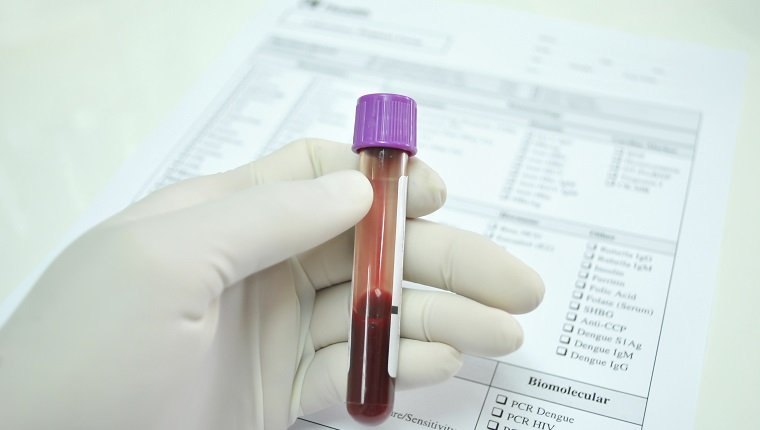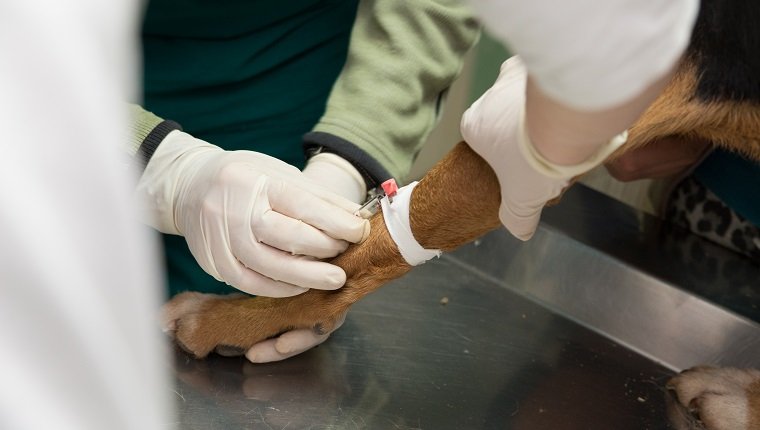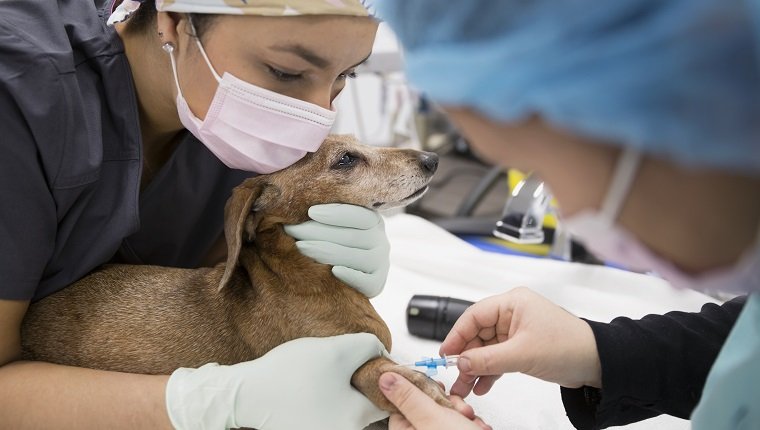You may hear of titer testing more often as a growing number of dog parents become concerned about over-vaccination or bad reactions to vaccine injections.
Titer testing is a means of determining whether your pet has enough antibodies to defend against viruses that they’ve already received vaccinations for in the past. Some dog parents believe that having enough antibodies makes another vaccination, especially an annual vaccination or booster, unnecessary.
You must discuss it with your vet if you intend to rely on titer testing to make decisions about your dog’s vaccinations. Here’s what you should know about titer testing and what it means for vaccinating your dog.
What Is Titer Testing?

A titer test is a blood test that measures the level of immune system proteins called antibodies.
When your dog gets a vaccination, their immune system responds by producing antibodies, which the body can use to fight off future infections. The titer test determines how many antibodies are still in your dog’s blood after one or more years from the time of vaccination.
Vaccines are important because they inject a replicated part of a virus or bacteria that is dead or weakened, which allows your dog to build up immunity without getting sick. Still, vaccines have risks, though they are uncommon and usually don’t outweigh the benefits.
Some dogs have allergic reactions to vaccines, which can rarely be extreme and result in anaphylaxis. Some dogs can develop a sarcoma, which is a mass that grows around the site of the vaccination due to inflammation. This mass can become malignant and spread cancer to other parts of the body.
Mostly swelling around the injection site disappears within a couple of weeks. Other side effects of vaccination can range from mild to serious, and over-vaccinating increases these risks.
That’s not to say vaccinations aren’t necessary. The major diseases that are vaccinated against are distemper, parvovirus, adenovirus, and rabies. These diseases have a mortality rate of 60 to 80 percent in young dogs, so the risk of rare complications from a vaccine doesn’t outweigh the danger of what they protect your dog against.
Still, if a dog’s immune system is capable of fending off these diseases, there may be no need to over-vaccinate and face the risks. That is what the titer test should determine.
What Do The Results Of A Titer Test Mean, And What Are They For?

Dr. Richard Ford, emeritus professor of internal medicine at the North Carolina State University College of Veterinary Medicine uses the acronym PIE to interpret results of a titer test. A test that shows a positive result for antibodies can determine protection, infection, or exposure (PIE).
For example, a positive titer test for Lyme disease or leptospirosis means infection, while a positive result on a titer test for ehrlichiosis implies exposure.
A titer test is appropriate for determining if your dog has sufficient antibodies to be immune to parvovirus, distemper, or adenovirus.
Some research suggests that the presence of antibodies doesn’t necessarily equate to immunity, and a low presence of antibodies doesn’t necessarily mean vulnerability. But it seems to be a fairly accurate measure according to most sources.
This is a subject of debate and controversy within the veterinary community. However, if a dog shows a high enough count of antibodies to these diseases, re-vaccinating may not be necessary.
What Can A Titer Test Tell Us?
The titer test is not appropriate for canine leptospirosis, bordetella (also known as kennel cough), or Lyme disease, as these vaccines only provide short-term protection.
Rabies is an unusual case. Vaccines for rabies give long-term protection, and the titer tests are very accurate. But the law in the United States mandates vaccination against rabies. No state will accept a titer test for rabies as a measure of immunity instead of vaccination at this time.
You can use the titer test to determine if your dog can forego re-vaccinating for certain diseases with your vet’s guidance. But it can be used in other ways, too.
Animal shelters could use these tests during animal intake or the outbreak of a disease to help separate low-risk and high-risk dogs. Veterinarians could use the test after puppy vaccination to find out if they’re ready for socialization with other dogs.
Certain countries and regions require titer testing to prove animals have been vaccinated for rabies before crossing the boarder.
You could also use it if you adopt an animal and you don’t know their immunization history.
How Often Should Titer Testing Be Done?

Titer testing can be expensive, though the price has come down more in recent years. It will likely be cheaper to vaccinate based on yearly recommendations. While your dog may face increased risk of side effects from vaccination, those side effects are still very rare.
Recommendations on how often to titer test vary. Some vets say yearly just to be safe. Others say tests every three years are all that are necessary, while others recommend every five to seven years.
Many titer tests suggest that dogs vaccinated against parvovirus and distemper have immunity for five to seven years, or they can have immunity for life.
There is certainly no harm in testing often other than the monetary cost. Although, it is debatable about what testing is necessary. You must discuss this with your veterinarian and decide what’s right for your dog.
It’s important to note that puppies should still receive their recommended core vaccinations. A titer test may show high levels of antibodies, which are provided by the mother’s immune system to her puppies. This immunity can actually prevent a vaccine from working.
Also, after puppyhood, this immunity can wear off, which is why vaccines and at least first year boosters are necessary. A titer test after the initial vaccination processes can determine if vaccines caused your pup to develop appropriate antibodies.
Consult your vet to determine when a first titer test should take place in order to provide accurate information.
Does It Reduce The Need For Vaccinations?

For parvovirus, distemper, adenovirus, and rabies, high antibody counts in titer tests likely indicate a re-vaccination may not be necessary. However, a low count doesn’t necessarily mean that a booster is needed.
Some experts claim that the immune system of a dog who previously had high antibody levels will produce “memory cells” that will pump out antibodies if there is exposure to the disease.
Ultimately the decision lies with the dog parent. If antibody counts are low, it may be worth the small risk of the side effects from a booster. That way, you’ll maintain peace of mind that they will not suffer from a potentially deadly disease.
Titer tests are a tool that can help you make that decision. However, you should always research for yourself, and you must discuss with your veterinarian before you put any plan into action.
Would you rely on a titer test to tell you if you needed to re-vaccinate your dog? Do you vaccinate according to your vet’s recommended schedule? Let us know in the comments below!








